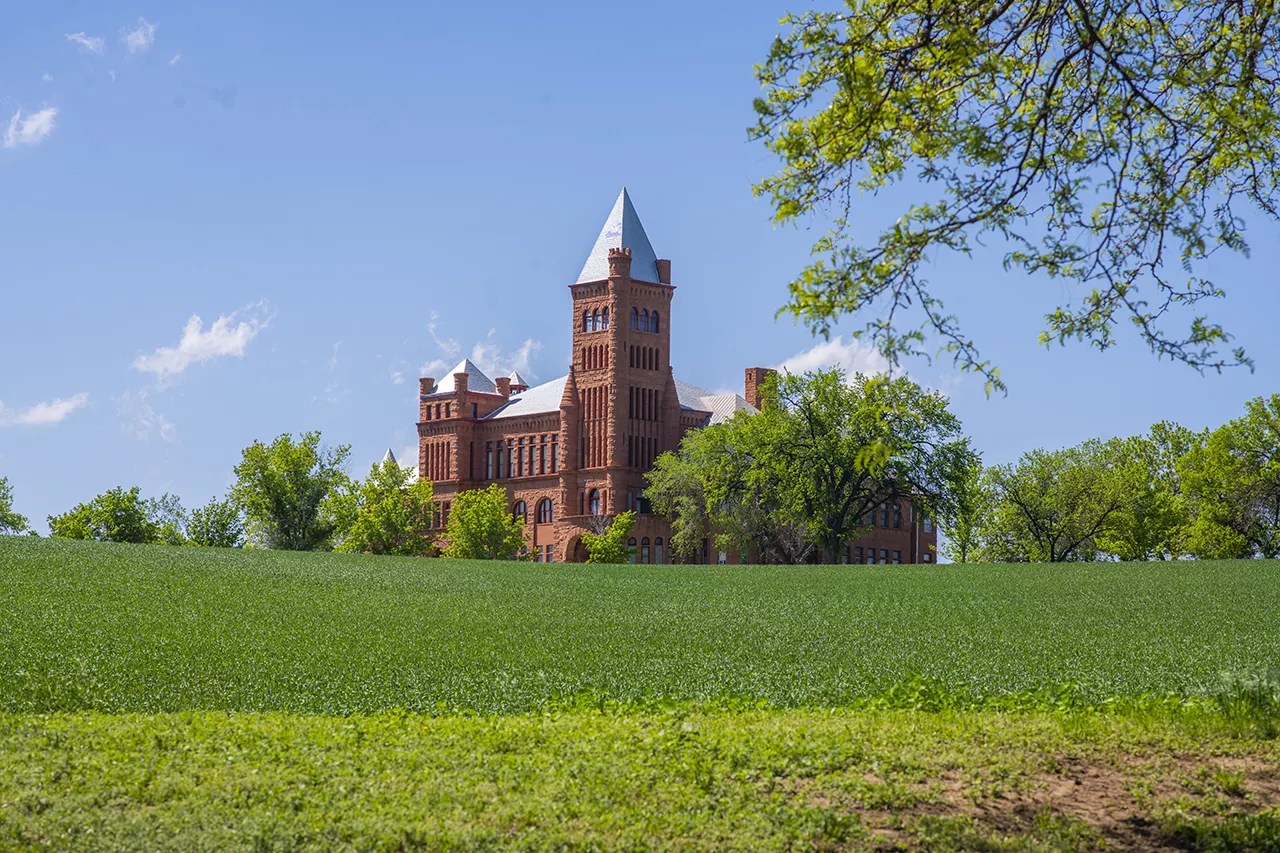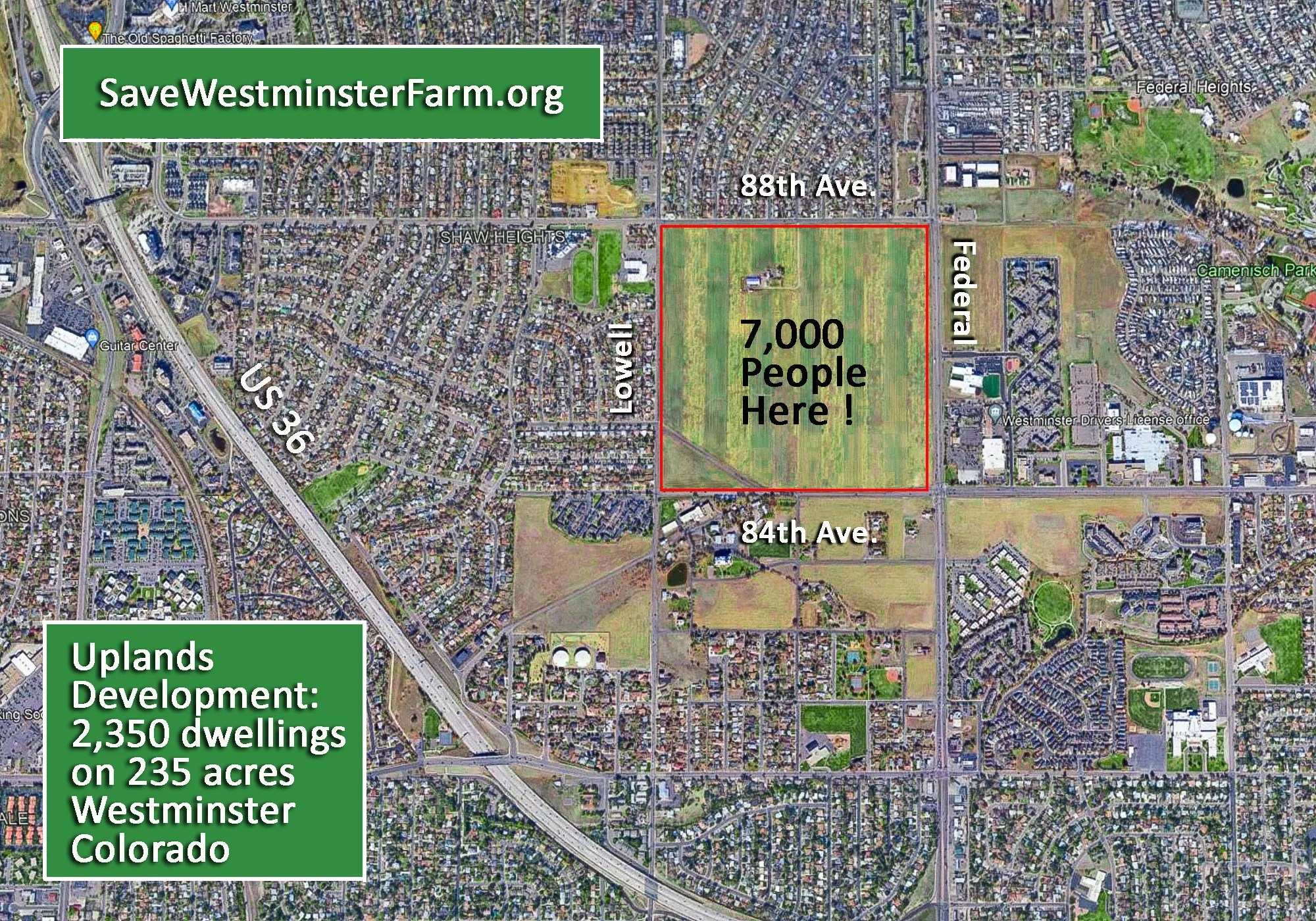
Evan Semón

Audio By Carbonatix
An open letter to Westminster City Council and the community of Westminster urging a NO vote to disallow the Uplands Development that would be built on the current farmland between 84th and 88th avenues and Federal and Lowell boulevards (and four other smaller surrounding parcels):
In the 1990s, I was a founder of the Great Outdoors Colorado Trust Fund – that is, I helped float, promote and pass the initiative that directed Colorado Lottery profits to protect open space, I helped write the enabling legislation, and I served on the GOCO board during its first eight years. In 2000, I was a principal in floating the Responsible Growth Initiative on the Colorado ballot. It was defeated, but would have given local governments more control of the management of their growth. (Our group was accused of trying to build a border around Colorado, and developers raised $7 million to defeat us.) These efforts taught me much about the science and culture of community development, and the challenges of population growth. Since then, I have been active in development issues related to climate change, including shrinking water supplies. I think my experience can be useful to the community of Westminster as it decides the fate of the Pillar of Fire Church farm.
Within the polemic of the issue, the director of the Rocky Mountain Land Use Institute told Westword last spring: “There’s like a million arguments with the problem with growth, but we can’t build a border around ourselves. We’re not an independent country. We can’t decide who gets to move here.” This was standard rhetoric when we tried to pass the Responsible Growth Initiative, and it is a classic growth management red herring. No, we cannot tell people not to come here, nor deny property owners the right to develop their land, but there are plenty of ways to legally have proper ratios of developed and undeveloped land in order to preserve community quality of life.
Since GOCO was created in 1993, $2 billion has been generated by the combination of lottery profits and local government open space taxes to put a park, trail or open space in every family’s backyard throughout all 64 Colorado counties, by buying two million acres of land that would have been developed. Colorado’s inventory of local parks and open space, on top of its vast federal and state public lands, is why Coloradans are the nicest, healthiest and most prosperous folks in America. In a few cases when the land threatened with development was too environmentally valuable and the landowner was not willing to sell or sell for fair market value, communities have condemned the land for open space. Thank goodness this is rare, but it’s still necessary when greed trumps the good of a community.
Perhaps the best argument to defeat inappropriate development is a more philosophical one. Again, I use a Rocky Mountain Land Use Institute quote from Westword‘s coverage: “We can argue about whether growth is good or bad, but as long as we have a strong economy, we’re going to attract workers, and we have to house them.” This assumes that we cannot dissuade people from moving to Colorado. With 7.94 billion people on Earth and more on the way, and not enough places for them to go on a finite planet, people will naturally migrate to jobs and the best qualities of life. Think Colorado! Do we really need to keep the doors wide open? No way. And if we do, guess what Colorado and its natural ecosystems will look like now and forevermore? Not good. Let’s not be “deer in the headlights” and assume it’s just going to happen and that we’ll find a way to deal with it. Instead, let’s be proactive and do what needs to be done within the rules of a democratic society to the fullest extent possible to protect Colorado.
Zoning has been used by local governments in America for over 100 years to better plan a mix of residential, industrial and commercial land uses, as well as to protect open space, in order to improve community quality of life. Legally, protection of these values supersedes private property rights.
Buy the land before it gets developed, and make it open space. If condemnation is necessary, use this as a last resort.

Savewesterminsterfarm.org
In no case allow community leaders to approve developments without the legally required proportion of open space – no exceptions! (The Westminster City Council proposes to reduce the required proportion within this development.)
Demand that community leaders and their planners prove water supply based upon real science for no less than 100 years to come for new developments before they are approved. Global warming is increasing exponentially at rates that climate scientists could never espouse or predict, because they would lose their objective credibility, and never before in the history of humanity has science been required to extrapolate data so far into the future. However, common sense allows any practical person to see what is happening to our water supplies now and how dire things will be in mere decades to come. It is amoral to allow builders to build homes if there will be no water for the families that inhabit them.
Do not succumb to the argument that open space protection is elitist, that those less fortunate suffer the most (think Boulder). Yes, less land means fewer homes, and supply and demand means home prices increase. This potential inequity can be avoided if local governments require developers to eschew big profits from big homes and require a dwelling mix in all developments that satisfies all economic levels. The classic example of lack of foresight and leadership of this dilemma exists in our Colorado ski resort communities, where worker housing is inadequate. This did not need to happen.
I know Westminster well. Its Parks, Trails & Open Space Department hired me to photograph those places recently for posterity, and to remind residents how progressive Westminster has always been whenever the Westminster open space tax will need renewal by vote. It is a Colorado community leader in protecting its quality of life as a function of the great outdoors, and acknowledges that outdoor recreation guarantees a healthy, happy and prosperous citizenry. I have a thousand photographs that corroborate this.
Finally, and on a higher level, management of growth is not a complicated issue. There are simply too many humans, too little habitable land and not enough fresh water to go around. There will be winners and losers. This is called natural selection, and it is a scientific fact. Let’s not be a loser in Westminster, or anywhere else in the most beautiful place on Earth: Colorado.
I call upon all residents of Westminster to speak in person at the Westminster City Council meeting at 7 p.m. Monday, December 13, at City Hall, 4800 West 92nd Avenue. If you cannot attend, leave a voicemail by calling 303-706-3111, or send an email to PublicComment@cityofwestminster.us before noon on December 13. However you communicate, urge a NO vote to stop the development and save the farm. Find complete information here: SaveWestminsterFarm.org.
John Fielder has been photographing the Colorado landscape for forty years, and promoting its protection for almost as many. Reach him through johnfielder.com.
Westword frequently publishes op-eds and essays on matters of interest to the community on westword.com on the weekend; the opinions in these pieces are those of the authors, not Westword. Have one you’d like to submit? Send it to editorial@westword.com, where you can also comment on this op-ed.